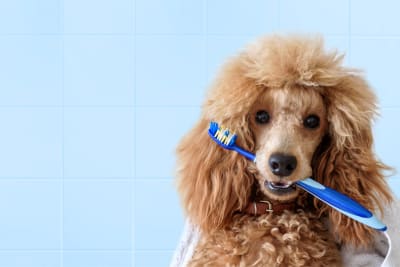Should I brush my dog's teeth? Yes! Just like humans, oral health and hygiene are important to our canine friends. Our South Wilton vets share why regular dental checkups and at-home brushing play an important role in preventing oral health issues that could lead to serious, painful conditions for your pup.
Why Is Dental Care Important For Dogs?
Like your own oral health, your dog's oral health is an essential element of their overall health and our South Wilton vets often see dogs showing early signs of periodontal disease (gum disease) by the time they reach about three years of age.
Apart from causing bad breath and cavities, poor oral hygiene in dogs can lead to severe periodontal disease which can cause painful erosion of the gums and loss of teeth. Numerous studies have also shown that periodontal disease increases a dog's risk of developing heart disease and other serious internal complications.
At-home oral health care routines paired with dental diets and treats can go a long way to helping your pup to clean their teeth, as well as helping to control the buildup of plaque and tartar. At-home care, combined with regular dental checkups by your veterinarian is the best way to keep your dog's mouth clean and healthy.
When you make your pet’s annual dental exam a priority, we can be proactive about signs of periodontal disease and ideally can treat any issues before they develop into something more serious.
What Will Happen During My Dog's Dental Care Appointment?
When you bring your dog in for its annual dental checkup, our South Wilton vets at South Wilton Veterinary Group will do a thorough exam and cleaning of your pup's mouth. We will look for any symptoms of poor oral health and recommend the appropriate treatment. Some of the things we will look for are:
- Extra teeth or retained baby teeth
- Bleeding in or around the mouth
- Inflamed gums
- Plaque or tartar buildup on teeth
- Discolored teeth
- Loose or broken teeth
- Drooling
- Bad breath
To make pets more comfortable during the exam and to prevent them from biting, we will administer anesthesia before beginning. This ensures the safety of both your pet and us and allows us to be thorough in our examination. Your pet will be assessed beforehand to ensure they are healthy enough to handle anesthesia.
Once your pet is safely sedated, we will perform a full oral exam (tooth-by-tooth) complete with charting and X-rays to look for any issues that might not be visible to the naked eye. Your pup's teeth will then be cleaned, and polished, and a dental sealant applied for extra protection.
Should I Brush My Dog's Teeth?
As a pet owner, you might be wondering "How can I clean my dog's mouth at home?". Here are a few easy ways that you can help to keep your dog's teeth clean and healthy:
- Use a finger brush from your vet, or a child’s toothbrush, along with specially designed pet toothpaste to brush your pet’s teeth daily to remove any plaque or debris.
- Use a plaque prevention product (your vet can recommend some), which you can apply to your pet’s teeth and gums or add to their drinking water. These products act as a barrier to prevent plaque buildup.
- Offer your pup treats such as dental chews or special foods designed to help prevent plaque buildup and tartar.
Dental care is an important part of your pet's overall health. Be sure to book your pet's annual dental exam today, your dog will thank you.
Note: The advice provided in this post is intended for informational purposes and does not constitute medical advice regarding pets. For an accurate diagnosis of your pet's condition, please make an appointment with your vet.
Is your dog due for a dental exam and cleaning? Contact our South Wilton vets today!
 Looking for dog dental care in South Wilton?
Looking for dog dental care in South Wilton?
We're always accepting new patients, so contact our veterinary hospital today to book your pet's first appointment.
Related Articles View All
C-Section for Dogs: Everything You Should Know
Our South Wilton vets share some information about c-sections in dogs, when they might be needed, and what you can expect.
Enucleation: Eye Removal in Cats & Dogs
Learning that your cat or dog needs eye removal surgery can be upsetting, and you'll probably have many questions. Our veterinarians in South Wilton explain pet eye removal, recovery times, potential complications, and more.
Why does my pet need a urinalysis?
Your vet can perform a urinalysis to determine whether your cat or dog may have a health condition or disease that needs treatment. Here, our South Wilton veterinarians explain why regular urinalysis testing for pets is a critical part of their care.
Understanding Blood Tests for Dogs
Dogs and cats often require diagnostic blood tests to reveal vital health information about underlying health conditions. In this post, our veterinarians at South Wilton explain the significance of these tests for pets.

